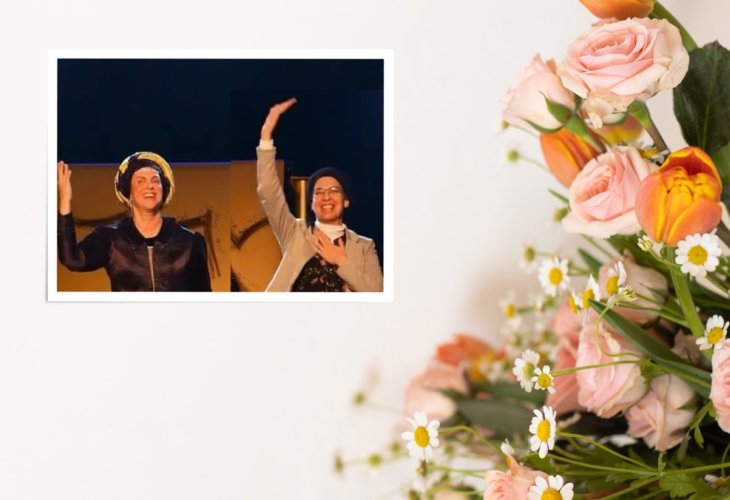"Tel Avivians and Ultra-Orthodox from Bnei Brak Attend Our Shows"
How do Sharon Aharoni and Tamar Avnon attract women from all sectors to their shows? How do they tailor their performances to a wide range of audiences, and how do they balance the needs of religious actresses with those who are not observant? A behind-the-scenes look at the 'Eshta Theater.'
 Photo: Talia Engelman
Photo: Talia EngelmanWhat happens when five completely different women, who have never met before, find themselves in a single apartment in Uman during Rosh Hashanah? Well, you didn't really think we'd reveal the entire plot of 'Floor 8 and Above,' did you? The play is produced by theater women Tamar Avnon and Sharon Aharoni.
But what's behind this show, and more precisely behind these two women, is no less than a fascinating story. Tamar comes from the field of cinema and was a film editor and commercial director at the Government Advertising Bureau. At some point, she underwent a "sort of return to faith" (as she puts it) and grew closer to Breslov Chassidism. Since then, she has been working in the field of cinema from a religious perspective.
Sharon Aharoni was born and raised in Miami to Israeli parents. In addition to her involvement in the music field, she holds a degree in business management, thus bringing both art and a business mindset when she entered the performing arts. Together with Tamar, she established in recent years 'Eshta Theater,' focusing on women's shows. "The most interesting thing is that Sharon is a Chabad follower and I am a Breslov Chassid," notes Tamar, "some might find this to be contradictory, and indeed, it can appear that way, especially as we build scripts for our shows or deal with messages and content."
"But it's all from a good place," Sharon quickly adds, "I don't recall any arguments or conflicts. Each of us brings her side, and together it complements and adds depth to the shows."
 Photo: Talia Engelman
Photo: Talia EngelmanThe Goal: Creating Unity
The acquaintance between Tamar and Sharon started in a rather interesting way. "A few years ago, I started working in the women's theater department at Ofer Halevi's," says Tamar, "and I met Sharon there, who was the production manager and actually ran the department."
"From the very first moment, we realized we had a lot in common," adds Sharon, "thus, we formed a connection that initially was purely professional but quickly developed into a good friendship. We eventually both left Ofer's theater and established 'Eshta Theater,' which is much more than a theater, and for us, it's the fulfillment of a shared dream."
What's so special about 'Eshta'?
Tamar: "From the very beginning, our theater was aimed at creating connections between women through acting and storytelling. This starts from the shows themselves, which always deal with connection, with content that leads to that goal, and continues with our diverse audience that comes from all sectors of the Israeli population. Additionally, there is the connection of every woman to herself."
"We reached a point where our audience includes Ultra-Orthodox women, some from Mea Shearim, sitting next to women from Shenkin in Tel Aviv, and of course, many baalei teshuva who longed for high-quality theater and a well-directed show," Sharon adds, "Women sometimes experience culture shock because it's something they didn't expect, and it's very moving. We meet women who are very surprised that we, the religious, have theater at a high professional level, and on the other hand there are women who are not accustomed to theater at all, as this is their first time attending such a show. This sometimes leads to really amusing stories, like someone who stood up in the middle of the show and asked to stop everything and wait for a few moments because her aunt was late, or someone else who approached me during the performance at 'control,' the place where I sit and manage the show's operation, and asked, 'I don't have a chair, can I take yours?'"
How do you manage to create a performance suitable for such a diverse audience simultaneously?
"When we write or create our work, we always ensure that there are several layers – peshat, remez, drash, and sod," explains Tamar, "Those who know the Torah, Halacha, and Midrashim well see the depth, and those who aren't familiar with these topics enjoy the outer shell that also carries a deep message. That's how we appeal to everyone."
Tamar also provides an example: "In the play 'Floor 8 and Above,' we tell a story of five women stuck in an apartment in Uman during Rosh Hashanah and what happened to them as a result. Of course, anyone not familiar with Chassidism and Uman enjoys, gets excited, and laughs at the story itself, but those who understand also grasp the depth, and those who delve even deeper notice hints like a bed, table, chair, and candle that characterize Rebbe Nachman of Breslov's stories. Sometimes women only identify elements after the show and notice various hints embedded in the theatrical language, which makes them want to see the show again. This might be what the verse means: 'In the future, theaters will become houses of study.'"
 Photo: shutterstock
Photo: shutterstockConnecting in the Theater
Who are the actresses in your shows?
Again, Sharon and Tamar manage to surprise. "We have 12 actresses in our team, and they also come from a variety of sectors. We intentionally do this to create unity and to show that we all come from different places."
Tamar: There was a group of women – cousins from central Israel who weren't observant at all and didn't even consider coming to our show, but they had a relative who 'insisted' that they all attend. When they entered the theater, they were actually repelled and angry at her: 'Why did you bring us to a challah-baking evening?' But she asked them to 'just stay five minutes.' After five minutes, they locked their smartphones and just sat in their seats without getting up until the show ended. Then they told us: 'You turned our heads around, this was not what we expected.'"
Sharon also recalls a particularly moving story: "A baalat teshuva mother came to one of our performances with her two daughters, who were completely secular. The relationship between them had been severed for years because cultural gaps were overwhelming. For her birthday, the woman decided to do something daring and told her daughters she was inviting them to a show. It sounded fine to them, but only when they arrived did they realize what kind of show it was and who was behind the theater. Eventually, they stayed in the theater, and the mother told us that the relationship with her daughters has only been strengthened since then because thanks to the show, they learned they share some common ground and can communicate. This is exactly our goal – to create unity in every possible sense. It's so important, and we sincerely believe it can happen."
You talk a lot about unity, but if we look outside, we'll see our lives are far from that. How do you feel about it personally?
They pause for a moment. It is evident that this is a topic that concerns them quite a bit. "As those engaged in Chassidic stories, we know what it means to go against the grain," Tamar finally says, "and precisely because we come from the world of doing, we also know how to distinguish between what the media portrays and the truth. Obviously, we both feel the great pain due to the division among the people; it’s such a huge and ugly tear. But exactly because of this, it’s clear to us that we must take action because if each of us doesn’t dream of unity and do something to bring it about, it simply won’t happen."
And Sharon adds: "Since we understand the great importance of the role we take upon ourselves, we make sure to start each day with shared Torah study, and mainly we simply have genuine love for every woman in the people of Israel. I believe that if there is love, goodwill, and non-judgment, great things can be achieved."
What about future plans?
Tamar: "We are planning another interesting show that will also deal with unity and connection, and we also plan to create some sort of community around us, which will accompany our performances and be a part of them."
"We intend to continue with the line we’ve adopted," Sharon adds, "because day by day we understand how far we can reach through Ahavat Yisrael. We've chosen this powerful tool, and it obligates us to stick to it, constantly check our content, and be careful with every word, understanding that hundreds of women are sitting between us and every message penetrates and lands. We pray that we won’t make mistakes and that we’ll merit to continue connecting and only doing good."

